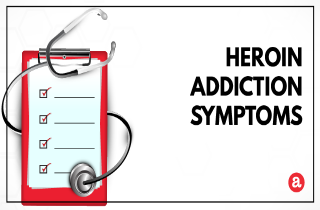Compared with other opiates and opioids, heroin’s addictive properties make this illicit drug one of the MOST ADDICTIVE available. Here, we review the clinical signs and symptoms of heroin addiction, as well as the most common signs of withdrawal and options for heroin addiction treatment. Your questions about heroin addiction or helping addiction to heroin are invited at the end.
Heroin addiction signs
Heroin is highly addictive drug, among one of the most rapidly acting opiates. Produced from morphine, and seldom found on the streets pure, heroin is often “cut” with other drugs endangering the life of the user. So how big are the chances that someone you care for may be a heroin addict?
The first sign of addiction is habitual use. Routes of administration for heroin include injecting, snorting or smoking. Each mode of administration is associated with a specific risk factor and causes severe side effects. Most addicts, who have asked for help on their own had been injecting heroin, while the research has also discovered a pattern of use, from injection to sniffing and smoking. For example, injecting heroin typically occurs up to 4 times a day. However, all three forms of administration are addictive, no matter the differences between their peak action levels.
Symptoms of heroin addiction
Heroin addiction is a chronic disease characterized by drug seeking and compulsive behavior. The Diagnostic and Statistical Manual of Mental Disorders (DSM) clinical criteria for heroin addiction states the framework under which health care providers diagnose addiction to heroin. These include four main characteristics of addiction, including:
- Compulsion to use (a thought process which compels use)
- Craving (an intense desire to use heroin)
- Loss of control of amount or frequency of use
- Use despite consequences
Furthermore, addiction to heroin understands changes in the brain on molecular level, as heroin interacts with transmitters associated with pain, pleasure and motor activity. Tolerance to heroin can be present during cases of addiction, which often acts as an additional stimulant to use higher doses of heroin.
During addiction there is also a degree of physical dependence to heroin, evidenced by the existence of withdrawal symptoms when doses are cut off or lowered. Withdrawal symptoms may occur with few hours after the last dose of heroin taken. Here are the most common signs of heroin dependence, which occur during withdrawal:
- cold flashes
- diarrhea
- goose bumps
- insomnia
- leg twitches
- muscle and bone pain
- restlessness
- vomiting
Heroin addiction symptoms: Can they be treated?
Can you treat heroin addiction? Yes, heroin addiction symptoms can be treated. In fact, there exists a variety of options for heroin addiction treatment. As with any other drug, the effects of treatment are most successful when heroin addiction is spotted and treated on time. However, there is no perfect treatment technique that can be applied for all addicts. Each patient is treated as an individual case. Still, heroin addiction is most commonly treated with a combination of pharmacological and psychological interventions.
Medications for heroin addiction include methadone, LAAM, naltrexone, and buprenorphine. The effect of methadone is that it blocks the effects of heroin and minimizes or stops withdrawal symptoms. Methadone maintenance programs have a history of over 30 years in heroin addiction treatment. This kind of opiate substitution therapy is effective when properly prescribed and administered; methadone is not intoxication nor sedating, and has no influence on every-day activities such as driving a car. Other possible pharmacological approaches include is LAAM (levo-alpha-acetyl-methadol), naltrexone and buprenorphine for targeting cravings or blocking euphoric effect of heroin.
Behavioral and psychotherapies include both inpatient and outpatient programs which individually match the specific needs of each person. One of these therapies is contingency management, following the “voucher” system. On the other hand, cognitive behavioral therapies address the thinking, expectations and behaviors, in order to ruin the destructive ones. Finally counseling (individual, group, or family) can help a heroin addict resolve issues which compel use of heroin.
Signs of heroin addiction questions
We hope to have covered some of the basic symptoms of heroin addiction here. However, if there is something that you would like to ask us, please feel free to post your question in the comment section, and we will provide you with a personal and prompt answer.










Related Posts